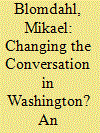|
|
|
Sort Order |
|
|
|
Items / Page
|
|
|
|
|
|
|
| Srl | Item |
| 1 |
ID:
168889


|
|
|
|
|
| Summary/Abstract |
What strategies does the United States pursue when it no longer perceives overt military intervention as politically viable or desirable but the problems or issues for which it was formerly undertaken remain? This analysis identifies three such periods in American foreign policy since the United States became a World Power and draws from the work of Peter Hall to develop a typology of strategies according to the magnitude of policy change. These range from adjustment in the settings of interventionism – persistence; the substitution of alternative instruments of foreign policy – ameliorism; and the principled rejection of interventionism in conjunction with a more systematic critique of prevailing foreign policy assumptions – transformationalism. Yet each approach is beset by certain structural limits and contradictions arising from the domestic politics and constitutional-institutional system of the United States that are important in understandiing and appreciating more fully the challenges – and opportunities – of the period ‘after interventionism’.
|
|
|
|
|
|
|
|
|
|
|
|
|
|
|
|
| 2 |
ID:
168887


|
|
|
|
|
| Summary/Abstract |
This analysis uses case study methodology to further the understanding of the diversionary theory of war in specific cases. It employs a model consisting of five propositions that build upon existing qualitative research on diversionary war theory. The synthesised framework examines one possible case of American diversionary military actions: President Donald Trump´s decision to launch missile strikes against Syrian airfields on 7 April 2017. The study tests the descriptive accuracy and further develops the diversionary theory of war, in essence, generally suggesting that empirical support for the diversionary logic in this case is mixed.
|
|
|
|
|
|
|
|
|
|
|
|
|
|
|
|
| 3 |
ID:
168888


|
|
|
|
|
| Summary/Abstract |
The United States was at least partly culpable for the failure of denuclearisation agreements with North Korea concluded during the presidencies of Bill Clinton and George W. Bush in the 1990s and early 2000s. American failure to implement commitments in a timely manner arose from a combination of domestic and presidential politics, the constraints imposed by international partnerships, and bureaucratic structures and procedures. For its part, North Korea implemented its commitments faithfully until its leadership’s increasing disenchantment with American tardiness and perceived lack of good faith.
|
|
|
|
|
|
|
|
|
|
|
|
|
|
|
|
| 4 |
ID:
168886


|
|
|
|
|
| Summary/Abstract |
This analysis examines the foreign policy features and domestic implications of British policy towards Iran between 1974 and 1976. Starting with the assumption that economic interests, as well as Cold War imperatives, shaped British policy towards Iran into one where human rights had no space, the conduct of Britain’s foreign policy apparatus towards the Shah vis à vis the disturbing reporting of human rights abuses in Iran and the intensification of anti-Shah activism in Britain remains important. Situating the relationship amongst societal forces, foreign policy, and diplomacy as the main analytical thread, this analysis brings new evidence to the field of Britain’s relations with Iran, anti-Shah activism abroad, and the effects of the government’s policy towards Iran on the British Labour Party.
|
|
|
|
|
|
|
|
|
|
|
|
|
|
|
|
| 5 |
ID:
168890


|
|
|
|
|
| Summary/Abstract |
This article recounts the author’s experience as a junior diplomat in the British Diplomatic Service in the late 1960s handling the file of Rudolf Hess, Hitler’s ex-deputy serving a life sentence in Spandau prison in Berlin. As the only Nazi leader still imprisoned there after the release in 1966 of Albert Speer and Baldur von Schirach, his fate as 'the lone prisoner of Spandau’had become an international issue. Sentenced at the Nuremberg trial of 1946, his fate was a matter for the four powers still occupying Berlin. Moscow was determined that as the last remaining symbol of the Hitler regime Hess should die there. In the West, however, and especially in Britain, there was a press campaign for his release that put pressure on the Foreign Office by way of letters from the public and parliamentary questions. As a desk officer for Germany, it fell to me to handle this by writing or drafting replies to the effect that as Hess was a prisoner of all four powers the decision required consent, that Moscow was adamantly opposed, and that Britain could not act unilaterally. But the real target of the press campaign, spearheaded by the Beaverbrook press through the Daily and Sunday Express, was Harold Wilson’s Labour Government. Anything that could demonstrate his alleged ‘appeasement’ of Moscow was grist to its mill. The now weeded file in the National Archives gives little hint of this politically-motivated agenda.
|
|
|
|
|
|
|
|
|
|
|
|
|
|
|
|
| 6 |
ID:
168884


|
|
|
|
|
| Summary/Abstract |
How and why did the Richard Nixon Administration end up with an Iran policy more in line with the preferences of the Shah of Iran than of the United States? At its onset, the Administration did not have a clearly defined or formalised Persian Gulf policy. Attempts to create over-arching guidelines regarding American conduct toward Iran were of little consequence, as the pro-Iranian inclinations of leading decision-makers led to day-to-day decisions that strongly favoured the Shah. This limited room for manoeuvre amounted to little more than acceptance of what was already established procedure. The Shah’s strenuous lobbying of American decision-makers, using their common Cold War considerations to his advantage and the effective sidelining of critical voices within the Nixon Administration, explain this outcome.
|
|
|
|
|
|
|
|
|
|
|
|
|
|
|
|
| 7 |
ID:
168883


|
|
|
|
|
| Summary/Abstract |
This analysis offers a state of the art examination of letters edited by the Spanish diplomat José Nicolás de Azara (1730–1804), who resided for years in Rome and Paris in the second half of the eighteenth century. In addition, it provides a new letter belonging to his correspondence with Giambattista Bodoni, the most prominent Italian typographer of Neoclassicism: Azara says goodbye to Italy and his beloved friend and artist. This new document illuminates the patronage practiced by Azara towards Bodoni; and the humanistic profile of their friendship is analysed and highlighted, which interprets it according to ancient models of the classical tradition such as those of Cicero or Seneca.
|
|
|
|
|
|
|
|
|
|
|
|
|
|
|
|
| 8 |
ID:
168885


|
|
|
|
|
| Summary/Abstract |
This analysis explores British perceptions and roles regarding the negotiation of the West German-Soviet Moscow treaty of 1970. Whilst supportive of West German Ostpolitik, Britain has received a very marginal role in the historiography of the treaty. By exploring the consultation process in the so-called Bonn Group of the United States, Britain, France, and West Germany, this exegesis explains that Britain played a leading role in building consensus and forming schemes to resolve the issue of the treatment of Quadripartite Rights and Responsibilities concerning Berlin in the Moscow treaty package. As background, this essay also explains the policies of the Harold Wilson’s Labour government and Edward Heath’s Conservative government regarding European détente in Europe, including West German Ostpolitik.
|
|
|
|
|
|
|
|
|
|
|
|
|
|
|
|
| 9 |
ID:
168882


|
|
|
|
|
| Summary/Abstract |
Although first explicitly coined in Renaissance Italy, the notion of a ‘balance of power’ – the conduct of state actors to meet the logics of power balancing – goes back to pre-modern times. Traditionally, scholars have looked to the Punic Wars and the early modern period as early evidence for the balance. However, the ancient Near East during the second-millennium BC has received far less attention. Yet Western Asia existed as an international arena of states fully integrated in a system based on interdependence and power balancing. In the field of International Relations, systematic analyses of this phase in world history remain under-developed. Accordingly, the question of when a systemic environment for the balancing behaviour existed for the first time has been addressed less in International Relations theory where the literature leans primarily on the European experience.
|
|
|
|
|
|
|
|
|
|
|
|
|
|
|
|
|
|
|
|
|